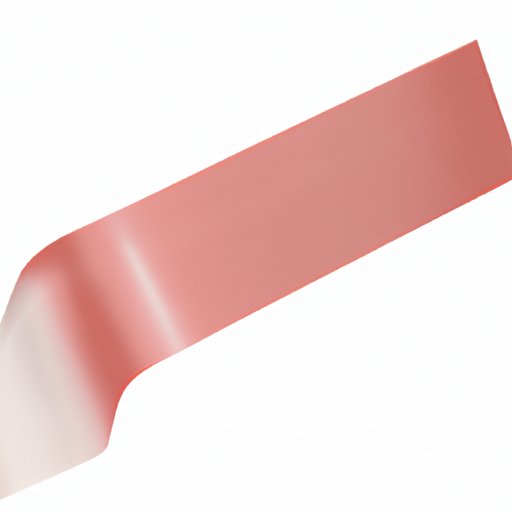
Introduction
Sticker residue is a common problem that can leave your belongings looking unsightly. Removing sticker residue is important to maintain the appearance of your items and prevent further buildup. In this article, we will explore natural remedies and chemical solvents along with proper techniques for using adhesive tape or commercial products to remove sticky labels, and we’ll provide tips for different surfaces and preventing sticker residue in the first place.
Natural Remedies for Sticker Residue
Natural ingredients such as coconut oil, baking soda, and vinegar are great for removing sticky labels and adhesive residue since they’re readily available and safe to use. Using coconut oil involves applying it on the sticky residue and let it sit for a few minutes before rubbing it with a cloth. Additionally, baking soda mixed with a small amount of water to create a paste, rub this paste onto the residue and let it sit for an hour before wiping it off. Vinegar helps to dissolve the residue by soaking the item in a vinegar solution for a few minutes. For all these remedies, wiping with a clean cloth is necessary afterward.
It’s important to note that natural remedies may not work for all types of sticker residue, and the method can be time-consuming for heavier residue. Furthermore, sometimes, the residue can react differently with some surfaces, so always test the natural remedy on a small area first and be cautious with more delicate materials.
Chemical Solvents for Removing Sticker Residue
Chemical solvents are often more fast-acting than natural remedies but can be harsh or even toxic. Rubbing alcohol, nail polish remover or even WD-40 are effective solvents. When using rubbing alcohol or nail polish remover, apply it to a cotton ball or cloth and let it sit on the residue for a few minutes before wiping it clean with another cloth. WD-40 should be sprayed and left for a minute or two before wiping it off. Remember to rinse the material after using chemical solvents, especially for rubbing alcohol or nail polish remover which can stain the material if not appropriately cleaned. Always wear gloves and use these solvents in a well-ventilated area.
Proper Technique for Using Adhesive Tape
One of the most effective but often overlooked techniques for removing sticker residue is using adhesive tape. Rolling the tape over the residue area a few times generally helps in removing the residue effectively. You can repeat this method until all the residue is gone. For a delicate surface, a less adhesive type of tape should be used since some tapes can leave behind their residue.
Recommendations for Commercial Adhesive Removers
When natural remedies and chemical solvents are not quite enough, commercial products can be used. Goo Gone and Un-Du are well-known commercial adhesive removers. These products work rapidly and often require less time and effort than other methods. Apply the product to the affected area and let it sit for a few minutes before wiping it clean with a cloth. It’s imperative to use a small amount of these products since excessive use may harm delicate materials.
Tips for Removing Residue from Different Surfaces
The removal of sticker residue is not the same for all surfaces. Using natural or chemical remedies can differ depending on the type of surface. For example, use a washcloth and a mixture of hot water and dish soap to remove residue from glass surfaces. For plastic surfaces, use vegetable oil or peanut butter, a quick rub to use them. For furniture surface, use a mixture of warm water and dish soap using a sponge or a soft cloth for delicate surfaces such as upholstery.
Prevention of Sticker Residue
Prevention is better than curing, so avoid creating sticker residue in the first place. Carefully remove stickers by peeling them off slowly from the material’s edge without applying pressure. Remove stickers before storing objects as over time, the adhesive on the sticker may stick to the surface. Using removable stickers, such as post-it notes, is another option that can avoid the adhesive buildup.
Conclusion
Removing sticker residue isn’t always an easy task, but with the right products and techniques, it is achievable. Employing natural remedies or commercial products can be an effective solution to this matter, but we must be mindful of the surface material we’re handling. Remember to test in an inconspicuous spot or an item of less importance before committing to larger projects. Properly using adhesive tape, removing stickers properly, and using removable stickers are easy ways to prevent residue buildup in the future. Sticker residue might be frustrating, but by following the steps in this article, you can remove it safely and effectively, keeping your belongings looking their best for long periods.




